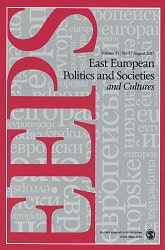Explaining Post-Communist Founding Elections Results through Initial State Capacity
Explaining Post-Communist Founding Elections Results through Initial State Capacity
Author(s): Jessica Fortin-RittbergerSubject(s): Government/Political systems, Period(s) of Nation Building, Post-Communist Transformation
Published by: SAGE Publications Ltd
Keywords: state capacity; founding elections; democracy; post-communist;
Summary/Abstract: While a consensus is emerging about the importance of state building and state capacity for democratization in both post-communist and developing countries, comparatively few explicit attempts have been made to provide empirical support for the relationship between the two concepts. Even more problematic is to find an explicit causal mechanism linking high state capacity with democracy. State capacity can be understood as the capability of the state to penetrate society, regulate social relations, extract resources, and appropriate or use resources in determined ways. In other words, strong states have high capabilities to complete these tasks, while weak states struggle to compete with private actors over extraction and appropriation of resources. But what makes strong states more likely to be democratic and, in turn, weak states less likely to be democratic? This article explores whether or not state capacity correlates with the outcomes of founding elections, that is, the first open elections in post-communist countries. In other words, do voters in states with higher initial capacity also tend to “throw the communist rascals out” in the founding elections?
Journal: East European Politics and Societies
- Issue Year: 26/2012
- Issue No: 04
- Page Range: 724-742
- Page Count: 19
- Language: English
- Content File-PDF

